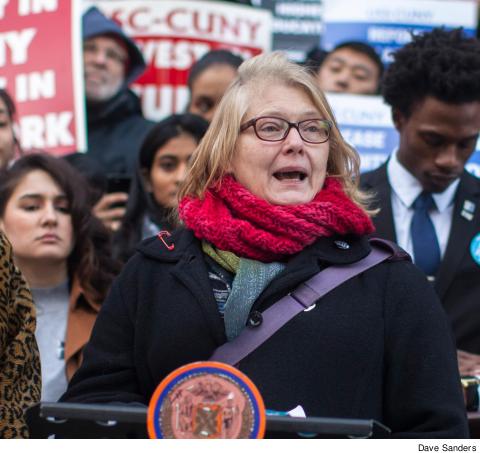Budgets and collective actions
 |
Sharon Persinger stepped down in May after two terms as PSC treasurer. She is no stranger to numbers or to unions. The associate professor of mathematics and computer science at Bronx Community College (BCC) grew up in West Virginia, the granddaughter of unionized coal miners from a working-class family. For her, the multimillion dollar PSC budget is more than a collection of numbers. It is “the infrastructure,” comprised primarily of members’ dues, that makes the union work.
“That’s the foundation of unions to improve the terms and conditions of employment for the people they represent,” she said. “In a union like ours, a lot of that [infrastructure] is connected. Our terms and conditions are our students’ learning conditions.”
BACKBONE OF THE UNION
The budget pays for the staff to support members, union campaigns, and the collective bargaining that wins our raises, time off and other contractual benefits. The budget underwrites the union’s advocacy in the state house and in city hall, where CUNY (and thus PSC contracts) are jointly funded. The budget, as many union leaders have said, is a “moral” and “political” document, because it is a declaration of the goals the union believes are important enough to fight for.
As treasurer, Persinger was the public face of the union’s finances, explaining at delegate assembly how the PSC spends its money.
“Accounting is about categorization, and it is about telling a story of the finances of the organization by looking at the finances with a lot of different lenses,” Persinger said. “There is looking at them in one day, looking at them over a year, and dividing money in pools – the money that comes in and the money that goes out.”
Persinger stepped into her role during uncertain times for the union, and uncertainty would remain a constant of her tenure: court cases that aimed to shrink the power of public sector unions, including the Janus v AFSCME decision that allowed public employees represented by a union to refuse to pay agency fees and, recently, the ongoing Coronavirus pandemic, which brought health and safety concerns into stark relief for a university system already plagued with serious health and safety issues.
BRACING FOR LOST DUES
As treasurer, Persinger estimated how much revenue the union would lose because of the Janus decision. She, along with union staff, devised a retropay calculator to help members estimate the amount of money they would get after six years without a contract. She explained the budget with the foundational support of the union’s finance director, Faye Alladin, who manages the day-to-day details of the union’s finances. She also helped negotiate a side agreement on online teaching observations with CUNY, reinserting crucial language that was lost in a draft agreement. And she was involved in the collective decision-making that powered the union’s campaigns.
One protest that Persinger said she will always remember is standing outside the U.S. Supreme Court the day the high court justices heard the oral arguments in the Janus case. She rode a bus, along with other PSC members, to Washington, DC. Together, with a PSC contingent, she stood outside with fellow union members – teachers, bus drivers, social workers and other public sector workers.
“I honestly think that we all knew that we were going to lose it because of how the composition of the court had changed,” Persinger recalled. “But we made it very clear that it was a battle that we were going to continue to fight. We knew how to fight it, and that was by building up our membership.”
UNION SISTERHOOD
Persinger will return to teaching at BCC, but will also serve on the PSC Executive Council as a university-wide officer. While she looks forward to having the summers “off,” she said she will miss being a part of the day-to-day collective decision-making at the union.
“There was a sisterhood,” said Persinger, describing the last three years of her tenure where all four principal officers at the PSC were women. “There was real comradeship and mutual support.”

